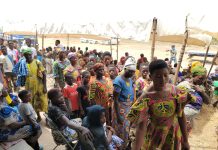BRAZZAVILLE, Congo (Republic of the), March 3, 2022/ — The Smart Africa Alliance has officially launched the Smart Africa Digital Academy (SADA) in Kintele International Conference Center in the presence of ICT Ministers from 18 members state of the Alliance on Thursday February 24th 2022.
SADA is a pan-African dynamic learning ecosystem to improve digital skills qualifications, employability, and meet the emerging talent needs of African citizens.
To ensure practical implementation, SADA has five modules of implementation namely:
Digital Skills for All – addressing an inclusive African citizen’s digital literacy;
STEAM Advocacy – strengthening the digital capacity of our educational systems to mainstream Sciences, Technology, Engineering, Arts and Mathematics;
ICT Specialized Training – developing and nurturing an ecosystem of digital technologies innovators and entrepreneurs;
Advanced IT Training – sustaining digital lifelong learning and research;
Capacity Building for Decision-makers (CBDM) – empowering our policy and decision-makers on latest technology trends to make informed decisions.
Since its start of operation in August 2020, focusing on the CBDM module, SADA has trained over 2000 policy and decision-makers across 26 countries in trending digital transformation topics including Artificial Intelligence Use Cases, 5G Connectivity, Data Protection & Privacy, Rural Broadband Policies, Security Technologies, Regulatory and Innovative Sandboxing Environments, Data Centers and Cloud, Digital Identity for Underserved, ePayment, etc. The objective is to reach over 22000 trained beneficiaries by 2023, supported by the SADA In-country implementation wave.
SADA seeks to complement existing platforms, content, and initiatives by bringing together a cross section of players within the capacity building ecosystem. So far, SADA has collaborated with the International Telecommunication Union, the World Bank, GIZ, IEEE, GSMA, Intel Corporation, Microsoft, HPE, Google, Ericsson, Rohdes & Schwartz, to name a few.
Having obtained initial funding from the German Federal Ministry of Economic Cooperation and Development (BMZ) in collaboration with the World bank to implement the AReg4DT
(Agile Regulations for Digital Transformation) SADA will focus on implementing National Digital Academies to support the uniquely identified digital skills priority needs at the national level. The current countries for implementation are Benin, Burkina Faso, Congo, Côte d’Ivoire, Ghana, Rwanda, and Tunisia.
Addressing the audience during the launch in Congo, The CEO of Smart Africa, Lacina Koné commented: “Skilling a billion citizens may seems an impossible task. As a multi-stakeholder coalition, SADA will achieve this through the powers of ownership, collaboration, and partnership to define a sustainable environment for skills development. We call for all our country members state, private sector, development partners and any interested stakeholder to support the SADA initiative to join this ambitious yet achievable programme”.
SADA in Congo will be run with the African Centre for Artificial Intelligence Research (CARIA) in the capital city Brazzaville focusing on Policy Makers, Youth and Professionals.
Additional countries are expected to launch their National Digital Academies in the next coming months.
With a vision to create a single digital market in Africa by 2030, the Smart Africa Alliance will ensure an all-inclusive digital transformation by building the digital skills of African citizens.
About Smart Africa:
Smart Africa is an alliance of 32 African countries, international organisations and global private sector players tasked with Africa’s digital agenda.
The alliance is empowered by a bold and innovative commitment by African Heads of State to accelerate sustainable socio-economic development on the continent and usher Africa into the knowledge economy through affordable access to broadband and the use of ICTs.
With a vision to create a single digital market in Africa by 2030, the Smart Africa Alliance brings together Heads of State who seek to accelerate the digitalization of the continent and create a common market. Launched in 2013 by seven (7) African Heads of State, the Alliance now has 32 member countries, representing over 815 million people and over 40 Private Sector members committed to the vision and the advancement of Africa.










































